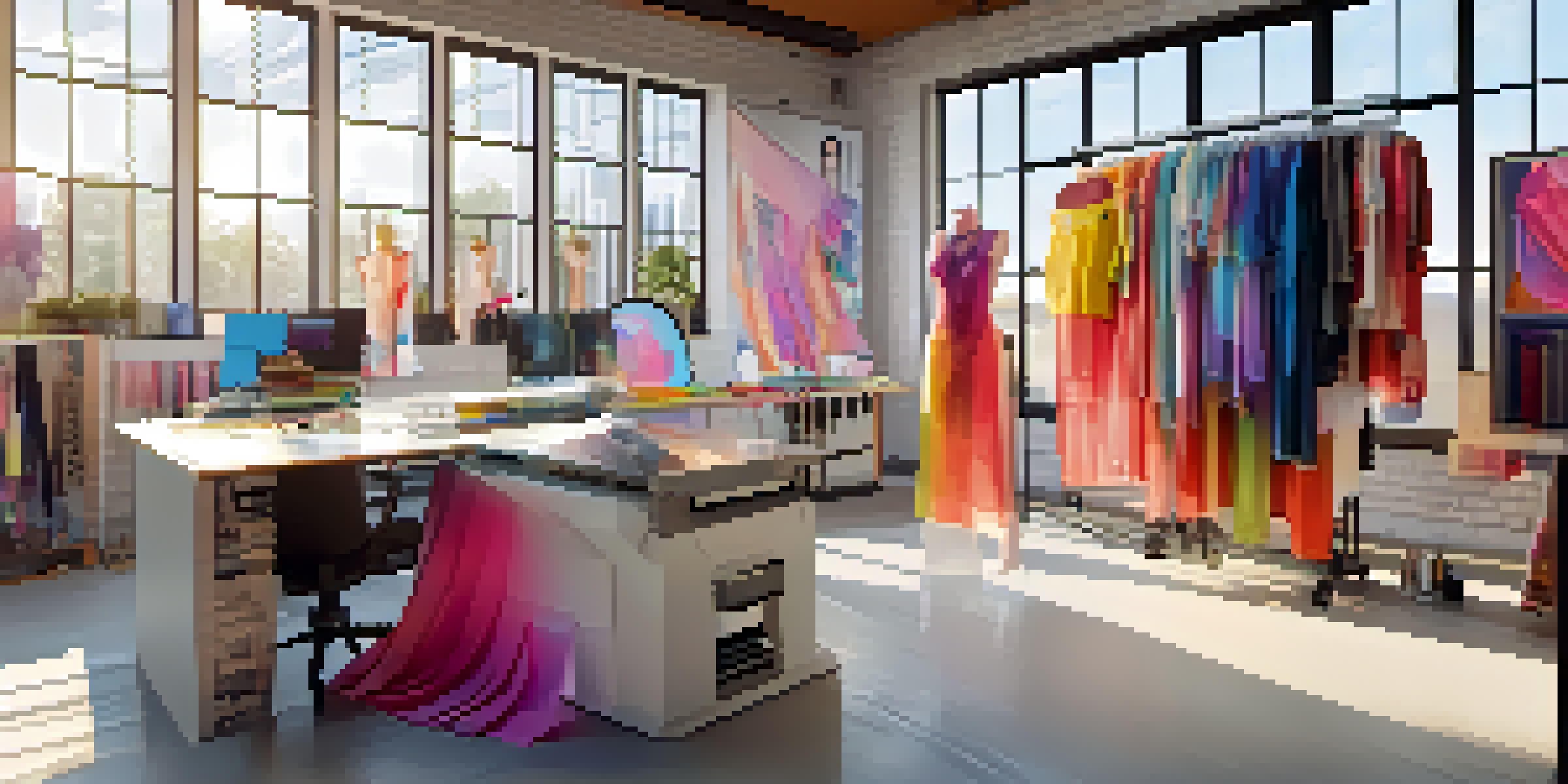Fashion Technology and Its Impact on Labor Ethics

Understanding Fashion Technology in Today's World
Fashion technology encompasses a variety of innovations, from digital design tools to smart textiles. These advancements streamline the design process, making it easier for brands to bring their ideas to life. For instance, 3D printing allows designers to create prototypes quickly without the waste associated with traditional methods. This not only saves time but also encourages creativity, allowing for more sustainable practices in the industry.
Fashion is the armor to survive the reality of everyday life.
Moreover, the rise of e-commerce and social media has transformed how fashion is marketed and sold. Brands can now connect directly with consumers, reducing the need for intermediaries. This shift has empowered small designers to enter the market, fostering diversity and innovation in styles and ideas. However, it also raises questions about how these technologies affect labor practices within the industry.
As fashion technology evolves, it is essential to consider its implications on labor ethics. Are these advancements benefiting workers, or are they merely tools for profit maximization? Understanding this dynamic is crucial for ensuring a fair and equitable future in fashion.
The Role of Automation in Fashion Production
Automation is becoming increasingly prevalent in the fashion industry, particularly in manufacturing. From automated cutting machines to sewing robots, these technologies promise efficiency and cost savings. While this can lead to lower prices for consumers, it also raises concerns about job displacement for workers in low-wage countries. For example, factories might replace skilled labor with machines, jeopardizing livelihoods.

On the flip side, automation can also create new job opportunities in technology and maintenance. Workers may need to adapt to new roles that focus on managing and programming these machines. This shift highlights the importance of retraining initiatives to ensure that workers can transition into these emerging roles. It's a double-edged sword that demands careful consideration.
Fashion Tech Boosts Sustainability
Innovations in fashion technology, such as biodegradable materials and energy-efficient production, are essential for promoting eco-friendly practices in the industry.
Ultimately, the impact of automation on labor ethics hinges on how companies implement these technologies. Ethical practices should include transparency about changes in employment and support for affected workers. Balancing efficiency with social responsibility is key to fostering a healthier industry.
Sustainability and Ethical Fashion Technology
Sustainability has become a buzzword in fashion, and technology plays a significant role in promoting eco-friendly practices. Innovations like biodegradable materials and energy-efficient production methods are gaining traction. Brands that leverage these technologies can reduce their environmental footprint while appealing to conscious consumers. For instance, companies utilizing organic fabrics and low-impact dyes demonstrate a commitment to sustainability.
Sustainability is no longer about doing less harm. It's about doing more good.
However, sustainability is not just about materials; it's also about labor practices. Ethical fashion technology emphasizes fair labor conditions and supports workers throughout the supply chain. This includes ensuring safe working environments, fair wages, and reasonable hours. By combining sustainable materials with ethical labor practices, brands can create a holistic approach to fashion.
The intersection of sustainability and labor ethics in fashion technology highlights the need for transparency. Consumers are increasingly demanding to know where their clothes come from and who made them. Brands that prioritize ethical practices will not only attract loyal customers but also contribute positively to the global fashion landscape.
Consumer Awareness and Ethical Fashion Choices
Today's consumers are more informed than ever about the impact of their purchases. Social media and online platforms have made it easier to research brands and their practices. This heightened awareness is pushing companies to adopt ethical practices, including fair labor standards. Consumers now often prefer brands that demonstrate a commitment to ethical labor, influencing market trends.
For example, many shoppers are willing to pay a premium for clothing produced by companies that prioritize fair wages and safe working conditions. This shift in consumer behavior encourages brands to be more transparent about their supply chains. As a result, companies are increasingly sharing information about their labor practices, helping consumers make informed decisions.
Consumer Demand Drives Ethical Change
Today's informed consumers are increasingly favoring brands that prioritize ethical labor practices, pushing companies to adopt more transparent supply chains.
Ultimately, consumer awareness serves as a powerful tool for change in the fashion industry. When shoppers demand ethical practices, brands are compelled to respond. This collective effort can lead to significant improvements in labor ethics across the board.
The Importance of Fair Trade in Fashion Technology
Fair trade practices are crucial in ensuring that workers in the fashion industry receive fair compensation and treatment. Fashion technology can aid in promoting fair trade by providing tools that enhance transparency in the supply chain. For instance, blockchain technology allows brands to track their products from production to sale, ensuring that ethical standards are upheld throughout the process.
By embracing fair trade principles, brands can foster a more equitable relationship with their workers. This approach not only benefits employees but also enhances brand reputation, as consumers increasingly seek out ethical options. Companies that prioritize fair trade can differentiate themselves in a crowded market, appealing to socially conscious shoppers.
However, the implementation of fair trade practices requires commitment and ongoing evaluation. Brands must actively engage with their supply chains and work collaboratively with workers to ensure fair conditions. This dedication to ethical practices is vital for building trust and sustainability in the industry.
Innovations in Labor Practices Through Technology
Recent innovations in fashion technology have the potential to transform labor practices for the better. Technologies such as virtual reality (VR) and augmented reality (AR) can enhance training programs for workers, helping them develop new skills in a safe environment. This investment in worker education not only improves individual capabilities but also benefits companies through increased productivity and reduced errors.
Additionally, platforms that facilitate communication between workers and management can promote a more inclusive workplace. By utilizing apps or messaging systems, employees can voice concerns and provide feedback directly to decision-makers. This open line of communication fosters a sense of community and can lead to improvements in working conditions.
Automation's Dual Impact on Workers
While automation in fashion production can enhance efficiency, it also raises concerns about job displacement, necessitating retraining initiatives for affected workers.
Ultimately, embracing these innovations can create a more ethical and efficient fashion industry. By prioritizing worker development and communication, brands can nurture a positive work environment that benefits everyone involved. In this way, technology becomes a force for good in the fashion world.
The Future of Labor Ethics in Fashion Technology
As fashion technology continues to evolve, so too will the conversation around labor ethics. Emerging technologies such as artificial intelligence (AI) and machine learning are set to reshape the industry landscape. While these advancements hold promise for efficiency and creativity, they also raise questions regarding job security and ethical practices.
To navigate this future, brands must prioritize ethical considerations in their technological implementations. This includes developing guidelines that address worker rights and labor standards in the face of automation. Collaboration with stakeholders—including workers, consumers, and advocacy groups—will be essential in shaping a fair future for the fashion industry.

In conclusion, the intersection of fashion technology and labor ethics presents both challenges and opportunities. By remaining vigilant and committed to ethical practices, the industry can harness technology for positive change. The future of fashion can be bright, provided that we prioritize the welfare of all individuals involved.